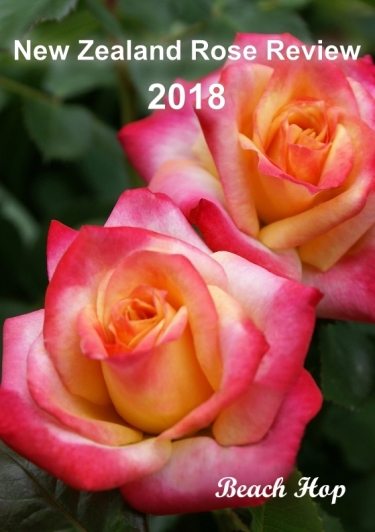The 2018 New Zealand Rose Review is now available ($9.50 within NZ) and well worth a look. The publication pulls together reviews from various spots around the country – the plants are reviewed for 5 years before moving to the ‘final analysis’ section – offering gardeners some invaluable information before making a selection.
All seven reviewers – from Northland to South Canterbury – rate the white hybrid tea Pope John Paul II (released in 2006 by American breeder Dr Keith Zary) for its fragrance and speed of repeat flowering but three mention that a single drop of moisture will ruin the blooms.

The cover shows Beach Hop, a new patio standard rose for 2018. Image: Courtesy of Hayden Foulds
All four reviewers (from Auckland to Otago) like the deep pink floribunda Caroline Bay (released in 2011 by Gisborne’s Mike Athy) for its floral display and good health, while two reviewers (of three) say the flowers of Tickled Pink (released in 2011 by Whanganui’s Bob Matthews) have weak necks.
The reviews also cover shrub roses, miniature and patio types and climbers, plus there are lists of favourite roses as chosen by NZ Rose Society members – Raspberry Ice has been the favourite floribunda for 26 years! An item of note on this list is that Iceberg has dropped off to be replaced by the Tauranga-bred Wild Cherry.
Paddy Stephens tops both the favourite HT (as she’s done for 14 years) and the healthiest rose lists.
Tauranga City Council is demanding $314 annual rent from Bayfair Community Garden, a group of volunteers who donate all their produce to the city’s Foodbank. However, one councillor is listening to the backlash and is now bleating (on her Facebook page, no less) that councillors didn’t look at who the 55 affected organisations were. They just passed the motion!
The Bayfair gardens run on the smell of an oily tag – and sometimes even less than that – and good on Jo Stock, the indefatigable co-ordinator, for not wanting to a donor to pay the rent. “It feels unethical to me to accept money from donors and give it straight to the council.”
Reports this week on studies in France reveal an alarming decline in bird numbers in farming areas – populations hit by large areas of monoculture (encouraged by EU policy) and a dramatic fall in insect numbers.
The Guardian article says that despite the French government aspiring to halve pesticide use by 2020, sales have climbed, according to EU figures.
“All birds are dependant on insects in one way or another,” said Dr Benoit Fontaine, co-author of one of the studies. “Even granivorous birds feed their chicks insects and birds of prey eat birds that eat insects. If you lose 80% of what you eat you cannot sustain a stable population.”
Whanganui Regional Museum curator of natural history Mike Dickison last year spoke to Jesse Mulligan on Radio NZ about how in the last decade or two there are many fewer dead insects on our car windscreens and in radiators and why that is. Listen to the 13-minute interview.
And if anyone would like to buy the Australian Landscape Conference, it’s for sale! Warwick and Sue Forge say this year’s event (March 23-27 in Melbourne) will likely be their last.
“From our first conference in 2002, they have grown steadily with the range of speakers, workshops, delegates and in many other ways. Attendances now range from 650 to 750 delegates from Australia and overseas. Overseas speakers tell us the conference is without equal anywhere in the world.”
I attended the last one held in New Zealand and the following one in Melbourne and can vouch for the quality of the event.
